Mr. Shutaro Takeda co-founded the "Fusion Energy" startup Kyoto Fusioneering Co., Ltd. while researching energy engineering and Sustainametrics.
In addition to receiving numerous international awards for his research and practical achievements, his international support activities have been highly evaluated, and he is currently the only Japanese national to be Knight of the Knights of Malta.
We asked Ms. Takeda, who is also a commentator on FBS Fukuoka Broadcasting "Bali Hayat! ZIP!", about the possibilities of university startups and international activities.・I received a message for college students.
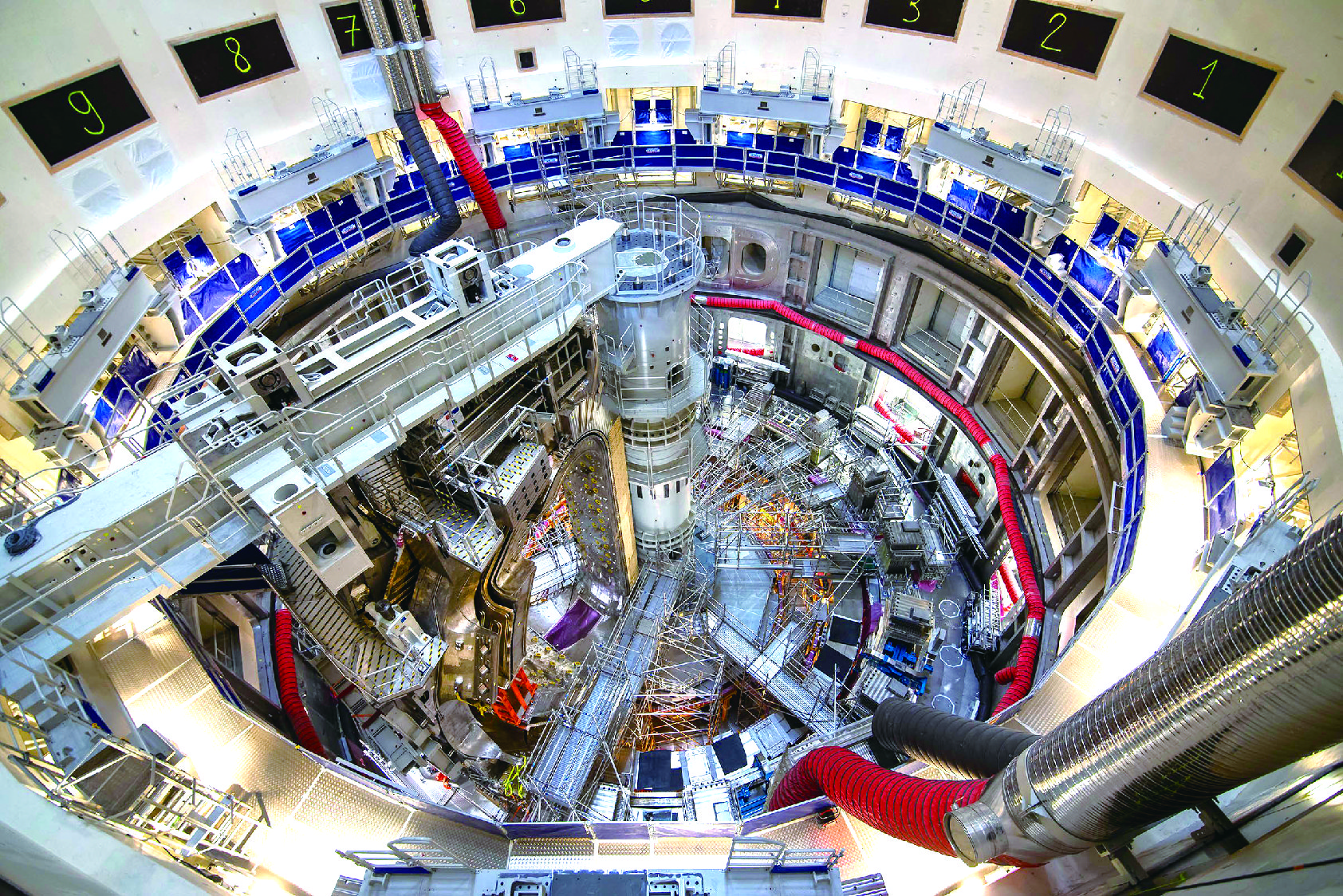 Provided by: ITER Organization
Provided by: ITER Organization
Kyoto Fusioneering Co., Ltd., which opens up the future by "FUSIONing" the world's "ENGINEERING"
Have you ever heard the term "fusion energy"?Fusion energy is the energy that was also called "nuclear fusion", and it is the energy that makes all the stars in the universe, including the sun, shine.The sun is made of hydrogen, and this hydrogen fuses and turns into helium, producing a huge amount of energy.
If we can create a sun on the ground, there are great expectations that it will become a future sustainable energy source that is friendly to the global environment.■.This is "fusion energy".Fusion energy can obtain a large amount of energy from hydrogen atoms abundantly contained in seawater, has a low accident risk, and is not biased by region, production area, or reserves, unlike oil and coal.It is the ultimate clean energy.
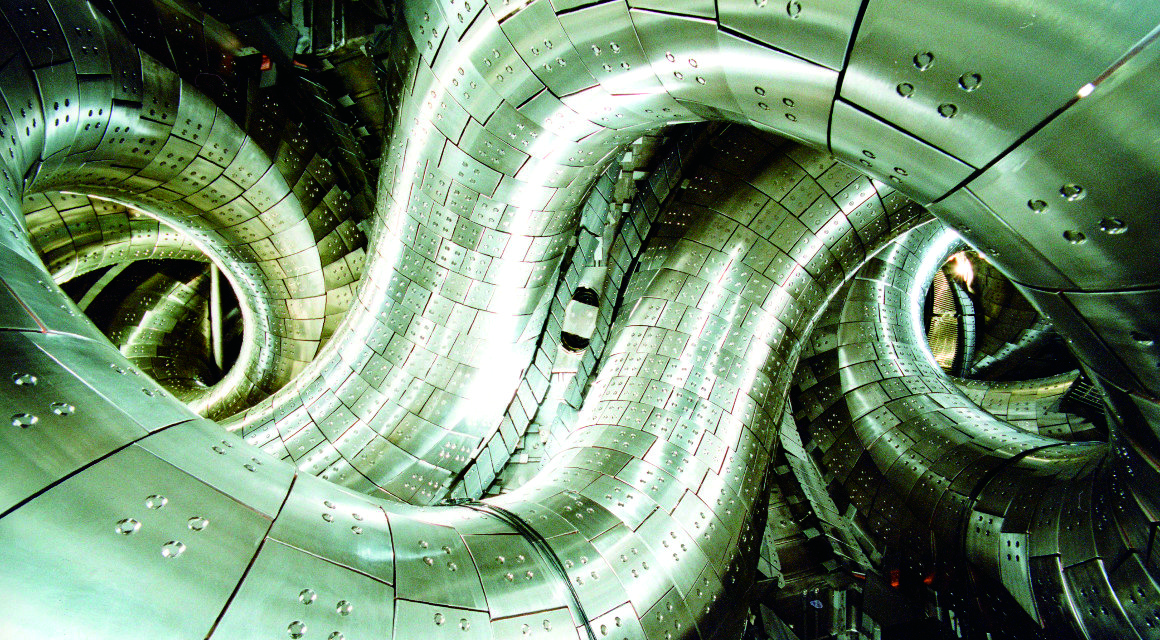 Provided by: National Institute for Fusion Science
Provided by: National Institute for Fusion Science
In fact, many startups and research institutes around the world are currently competing to develop fusion reactors that make full use of physics and plasma science, spending huge amounts of money.Under such circumstances, we have narrowed down our business areas to the two essential business areas of "research and development of plant technology" and "research and development of special core equipment", and we are launching a new startup "Kyoto Fusioneering" that has strengths. Co., Ltd. was established in 2019.
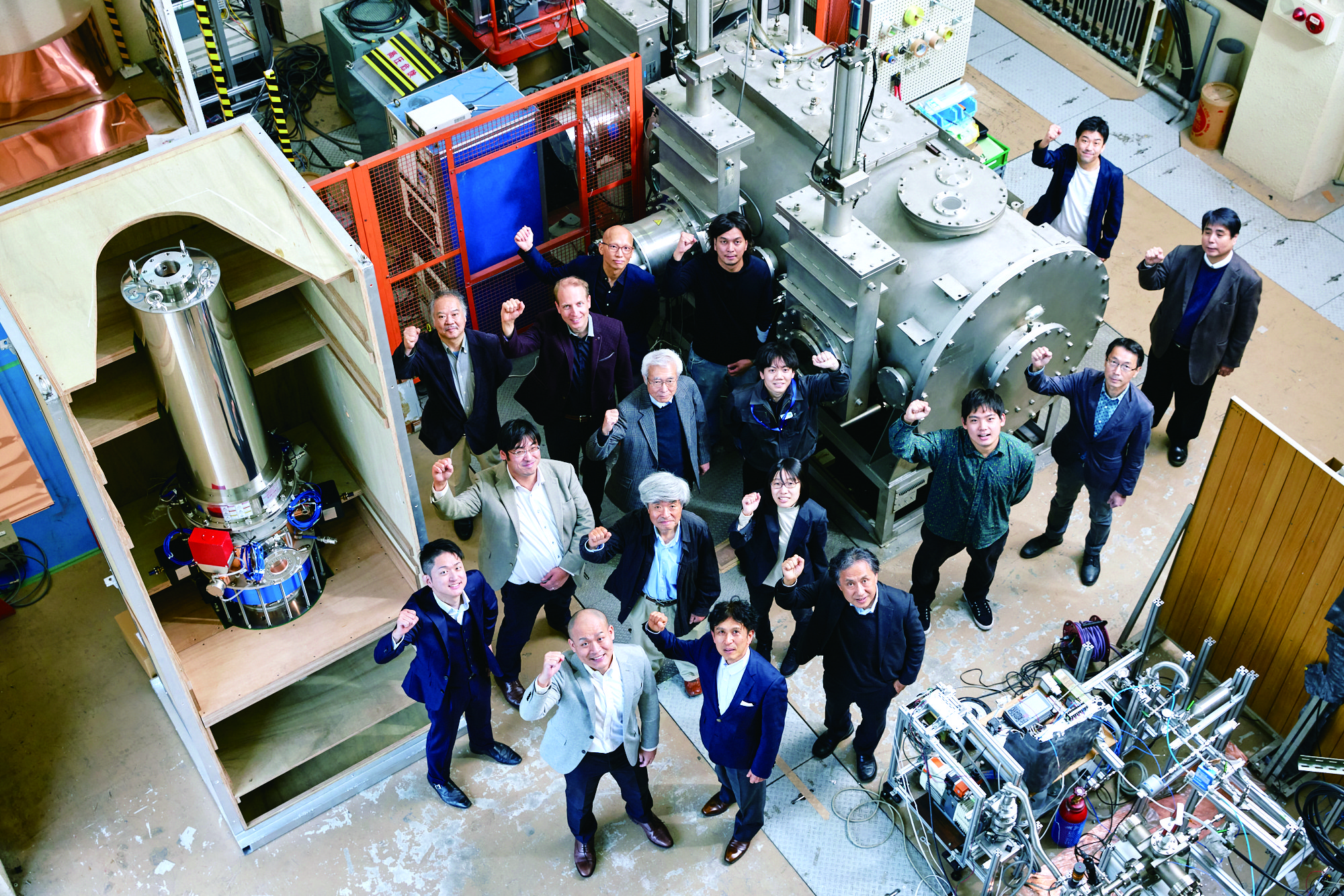 Provided by: Kyoto Fusioneering Co., Ltd.
Provided by: Kyoto Fusioneering Co., Ltd.
The company name is a coined word that combines "FUSION" and "ENGINEERING" with the desire to open up the future of energy by fusing engineers and fusion researchers around the world. It isCurrently, we have more than 70 employees, and we are developing research and development in close cooperation in Tokyo, Kyoto, the United States and the United Kingdom.
For research institutes and private companies around the world, we have been involved in the development of various core element technologies, such as the development of advanced hardware groups and design support, from the initial stage. We are developing a long-term business that manufactures and delivers major equipment.In fact, we have received orders for conceptual design of power plants and special equipment called gyrotrons from many customers such as the UK Atomic Energy Authority.
* National Institutes for Quantum and Radiological Science and Technology (ITER Domestic Designated Organization) HP (https://www.qst.go.jp/)reference
"ITER" is a super-large international project to realize the first nuclear fusion experimental reactor in order to demonstrate the scientific and technological feasibility of nuclear fusion energy for peaceful purposes. "" means "way" in Latin, and it is said that it contains the hope that it will be the road to the practical use of nuclear fusion and the road to international cooperation for the earth.
 IN SPACE – NOVEMBER 18: In this handout photo provided by NASA, a Solar and Heliospheric Observatory image shows Region 486 that unleashed a record flare last week (lower left) November 18, 2003 on the sun. large, hot, gas-filled loops above this region are visible. These post-flare loops are still active. (Photo by NASA via Getty Images)
IN SPACE – NOVEMBER 18: In this handout photo provided by NASA, a Solar and Heliospheric Observatory image shows Region 486 that unleashed a record flare last week (lower left) November 18, 2003 on the sun. large, hot, gas-filled loops above this region are visible. These post-flare loops are still active. (Photo by NASA via Getty Images)
How many years will it take for fusion energy to become a reality?
Until now, it has been said that "it will be 30 years from now" and so on.Over the last few years, however, the situation is changing.Many Western government officials have started declaring that it will be realized in 2035-2040.In fact, in the UK, candidate sites for fusion power plants have been selected, and in the United States, the White House has held a fusion energy summit and declared that it will be realized by 2040.In this way fusion
The growth in private sector investment is one of the factors behind the realization of energy.In the United States, the amount of investment in fusion energy by private companies will surpass that of the US Department of Energy in 2021, and research and development is shifting from state-led to private-sector led. The promotion of manned space flight by SpaceX in the 2010s is one such example.Massachusetts Institute of Technology (MIT), funded by the Bill Gates Foundation and Google
The startup Commonwealth Fusion System (CFS) also aims to commercialize power generation with an experimental reactor by 2025, with commercial completion in the early 2030s.
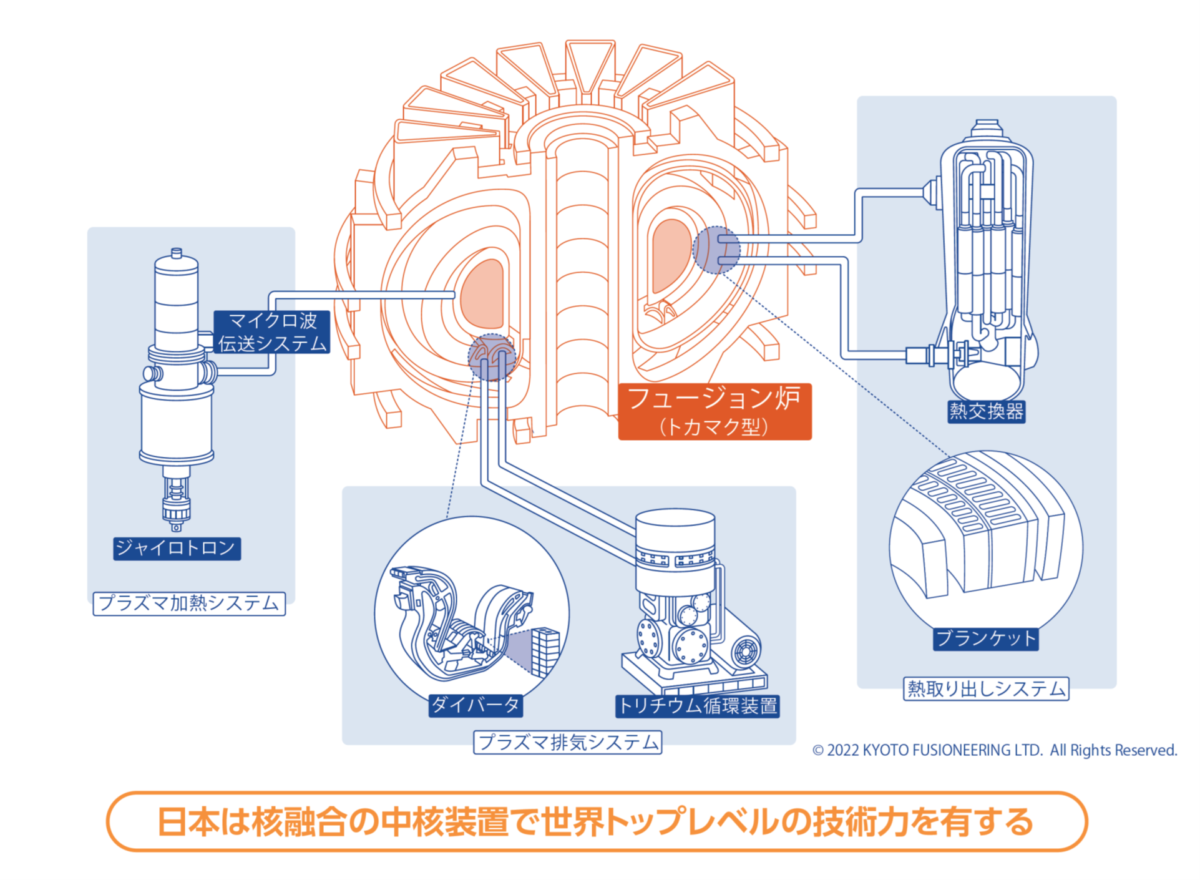
In the elevator?
We are very excited to be in a position to play a central role in this situation, but the reason for establishing the company was Richard Pearson, the fourth co-founder and current Chief Innovator. It was a meeting with Mr.It was 4 when I and my supervisor at the time began to formulate a plan to establish the Institute, but meeting Richard Pearson at an international conference that same year accelerated it.
Richard Pearson was already working at a startup at the time, so I visited his company after the meeting.Then, seeing cutting-edge research and development being carried out in a relatively small-scale facility there, I felt that there was a great possibility that we could do it ourselves.If the probability of success is only 1/100, it may be common to not even try, but my personality, which has been full of curiosity since I was a child, combined with the passion of the other founder, led to the company name Kaigi. We proceeded with the founding at a rapid pace, such as deciding at a social gathering later.
By the way, there is a prequel to meeting Richard.She happened to ride with me in the elevator of the hotel where I was staying in the United States, and when I had a lively conversation, I found out by chance that she was actually attending the same academic conference.Looking back, that was the turning point in her life.
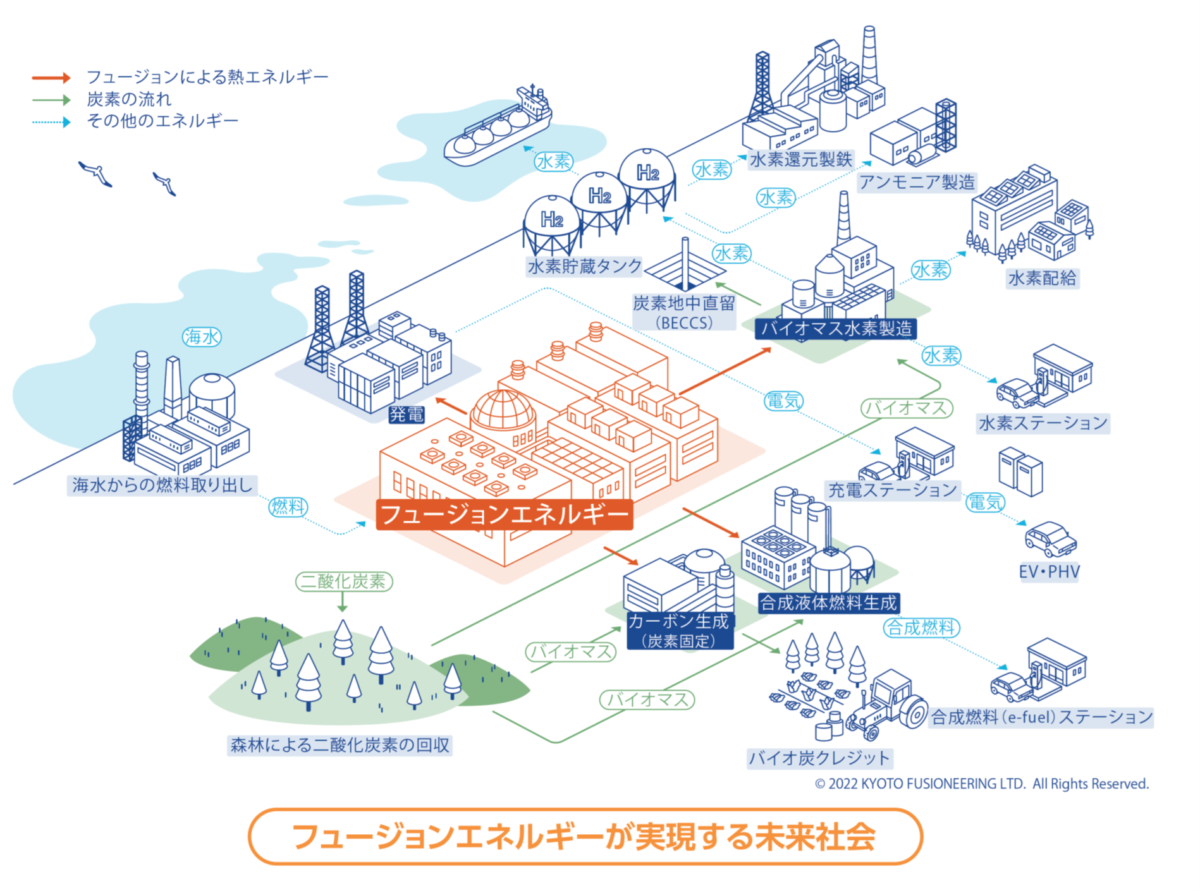
Universities start-ups have a lot of potential
Currently, it is said that there are about 3300 university-originated start-up companies in Japan.If there are 6 to 7 university professors in Japan, a simple calculation shows that 20 in 3300 has a company.Amazingly, 64 of the 50 companies have gone public.Roughly speaking, university startups have a XNUMX in XNUMX chance of making a big change in society.
Considering this, the probability is very high.If that's the case, I think it's worth taking on the challenge of interested students, young faculty members, and everyone involved in the university.
Recognizing that the emergence of vigorous startups is essential for the Japanese economy to return to a growth trajectory, the Japanese government has positioned 2022 as the "first year of startup creation" and has established a "five-year plan for fostering startups." I launched.In recent years, society has become more tolerant of the failures of startup companies, and a trend is emerging in which the right to try again and again can be obtained, such as if it fails once, then a second time, and if it fails twice, a third time.
Startups and small and medium-sized enterprises (SMEs) differ greatly in how they use and raise funds.Startups aim to create disruptive innovations that create new markets, and aim to obtain funding from investors and scale up significantly.
I'm here.This is often misunderstood by students, but startups are primarily funded by like-minded peers rather than debt. I sometimes meet students who say, "I'm not thinking about starting a startup because I'm afraid of remaining in debt."
Among start-up companies, I think the appeal of universities, in particular, is that they are able to combine the passion of academic pursuits with the mission of contributing to society.Working at a startup gives me a stimulus that I don't get at university.Pure scholars who devote 100% of their energy to research are indispensable to universities, but I believe that in the future it will be necessary to mix diverse researchers, such as adventurous faculty members with an entrepreneurial spirit. I'm here.
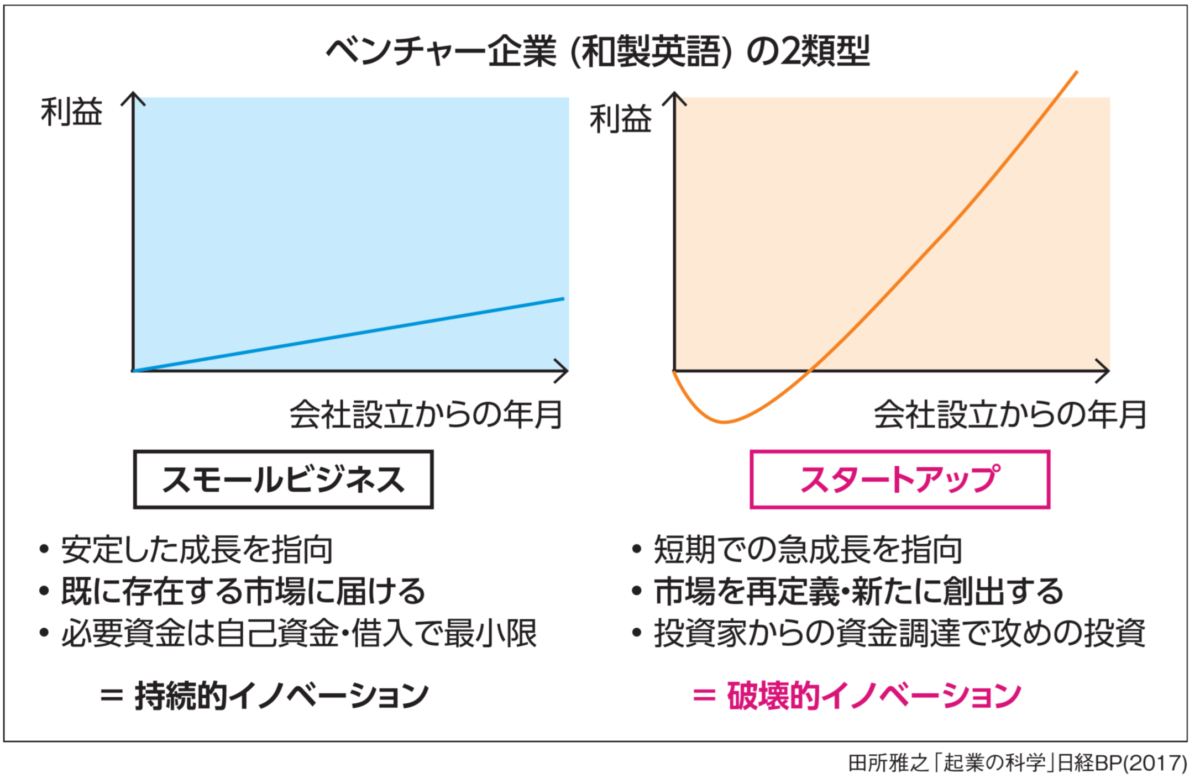
Another Big Dream: Establishment of Econometric Sustainability Science
My immediate goal is to be recognized as a world-class researcher.■to establishThis is because, although sustainability science to date has been based on an approach that integrates the humanities and sciences, there has not been much testing of hypotheses using mathematical methods. This is because it appears to be a field that is leading the way in philosophy.However, since sustainability science is primarily a study of social change, I believe it is necessary to have a quantifiable impact on society.
Therefore, I am currently working on an attempt to give empirical content to sustainability science, such as conducting socioeconomic analysis and technical evaluation of sustainable energy sources while incorporating knowledge of data science.From the circular economy to ESG and LCA, we will quantitatively analyze, integrate, and index from a data science perspective.Just as economics evolved into econometrics, I want to make sustainability science into econometric sustainability science.
We are currently hosting a research group, and have already collected 15 papers.We look forward to the future.
* Sustainability Science
It is said to have been proposed by Hiroshi Komiyama, the 28th president of the University of Tokyo. There are detailed explanations in "Answers to Global Warming Issues" (University of Tokyo Press) and "Earth Sustainability Technology" (Iwanami Shinsho).
The biggest challenge facing humanity in the 21st century is how to solve environmental problems and create a sustainable society for the next century. "In the latter half of the 20th century, warnings were issued about the deterioration of the global environment. In the 21st century, we must come up with a concrete answer to that. And that is also our mission as engineers." (Prof. Komiyama) , this book was written.I try to approach problems such as global warming and depletion of fossil energy mainly from the aspect of materials and energy.Furthermore, in the second half, the goal of 2050 is to reduce the amount of gasoline used by automobiles to 3/3, the power consumption of air conditioners to 10/XNUMX, and the energy used for all services to XNUMX/XNUMX. plan is being developed.About XNUMX years have passed since the time of writing, and Dr. Komiyama says, "I am more and more convinced of my assertion. However, the efficiency of air conditioners has already doubled since then, and this alone is a happy miscalculation. To put it more boldly, I should have kept it," he said with a smile on his face. [University Journal No. XNUMX: Published on September XNUMX, XNUMX, from an interview with the University of Tokyo President Hiroshi Komiyama]
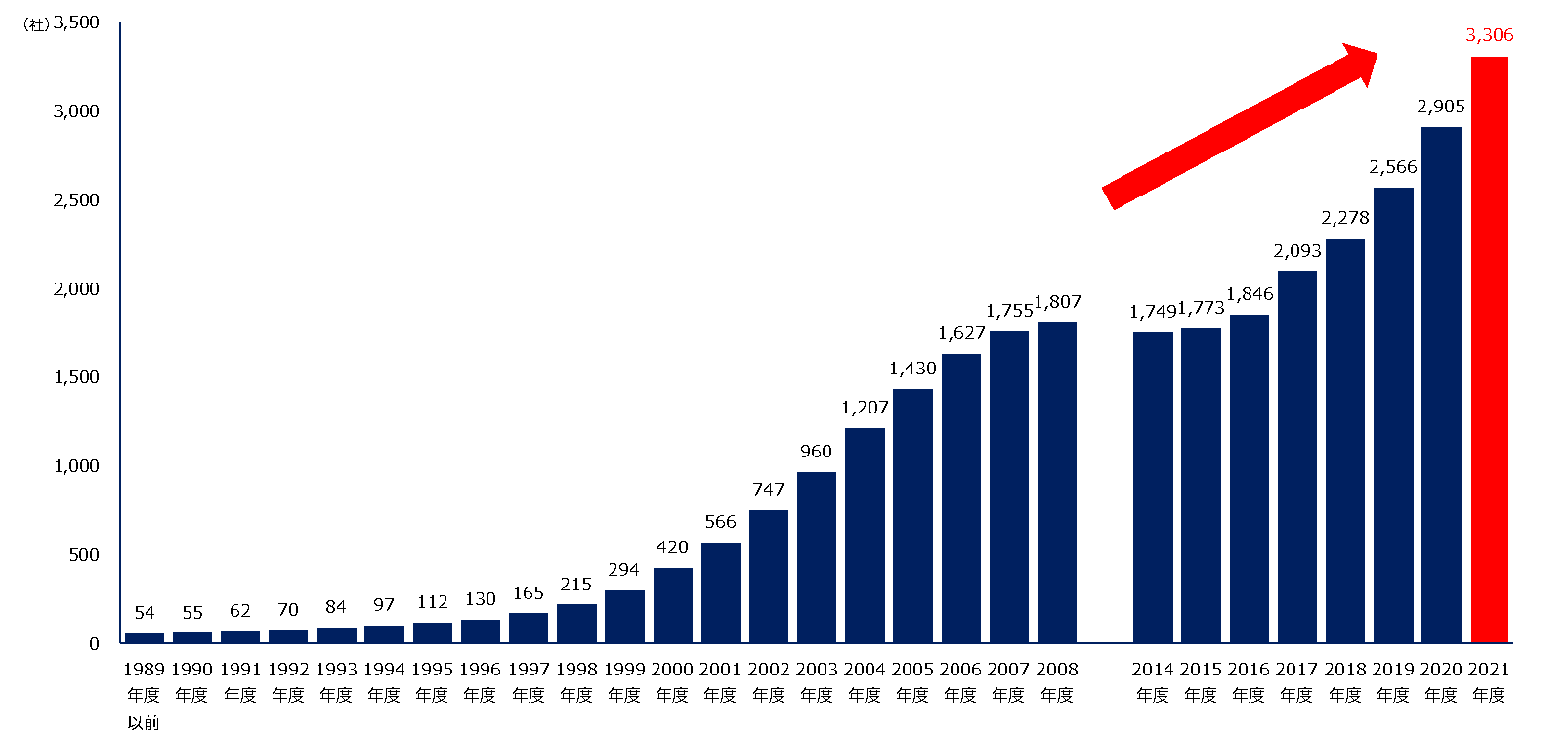 Changes in the number of university-launched ventures Since 2014, the number of startups has been increasing every year, and the number of companies and the number of increases reached their peak in 2021 (200 new establishments, 72 dissolved or closed) Ministry of Economy, Trade and Industry Reiwa 3 From the survey on actual conditions of university-launched ventures, etc.
Changes in the number of university-launched ventures Since 2014, the number of startups has been increasing every year, and the number of companies and the number of increases reached their peak in 2021 (200 new establishments, 72 dissolved or closed) Ministry of Economy, Trade and Industry Reiwa 3 From the survey on actual conditions of university-launched ventures, etc.
Message to high school and college students
Anyway, please value your intellectual curiosity and freely work on various things.It is also important not to worry too much about what others say.I believe that my strong intellectual curiosity and ability to take action from an early age have shaped me into who I am today.
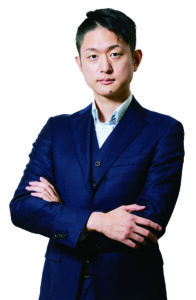
Hidetaro Takeda
Associate Professor, Urban Research Center, Kyushu University
Co-Founder, Kyoto Fusioneering Co., Ltd.
Ministry of Education, Culture, Sports, Science and Technology Committee for Fusion Science and Technology
DEMO Reactor Development Comprehensive Strategy TF
Biography:
Graduated from the Department of Applied Physics, Faculty of Engineering, Kyoto University in 2014. In 2016, completed a master's course at Kyoto University Graduate School of Integrated Arts and Sciences. In 2018, he completed early completion of the Graduate School of Energy Science, Kyoto University, and obtained a Ph.D. (Energy Science). In 2019, completed the master's program at Harvard University Graduate School (Sustainability Science). In 2018, he became a specially-appointed assistant professor at the Graduate School of Advanced Studies in Human Survivability, Kyoto University; in 2020, he became an associate officer in charge of the International Atomic Energy Agency (IAEA) project; In October 2022, he co-founded Kyoto Fusioneering Co., Ltd. He has received numerous awards, including the International Young Energy Professional of the Year Award, the British Institute of Physics IOP Young International Career Award, and the IAEA Director General's Distinguished Service Award.He is the only Japanese knight of the Knights of Malta. He is a commentator on FBS Fukuoka Broadcasting "Bali Hayatsu! ZIP!"He is from Tokai High School.
